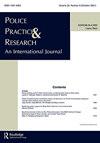刑事调查部门压力的定性探讨
IF 1.4
Q2 CRIMINOLOGY & PENOLOGY
引用次数: 1
摘要
关于警务压力的传统文献侧重于巡逻人员,并将研究结果推广到部门内的其他部门和级别。这没有考虑到不同的部分可能以不同的方式体验和管理压力。继Dabney及其同事(2013)对凶杀案调查人员的调查之后,本研究采用演绎编码对美国西南部一个中型警察局刑事调查科的21名调查人员的访谈进行了检验,这些调查人员涉及金融、财产、家庭暴力、人身和儿童犯罪。研究结果能够复制和扩展Dabney及其同事(2013)的结果,表明即使在人口统计学和操作上与原始部门不同的部门,这些调查人员也暴露于许多相同的压力源并受到其影响。虽然其中一些压力源与巡逻人员相似,但调查人员还受到其在警察组织中特定角色所特有的压力源的进一步影响(例如,繁重的案件负担、长期遭受创伤、与其他刑事司法行为者的额外参与)。研究和实际意义部门-无论是国际和国内-在管理调查员压力进行了讨论。本文章由计算机程序翻译,如有差异,请以英文原文为准。
A qualitative exploration of stress in a criminal investigations section
ABSTRACT Traditional literature on stress in policing focuses on patrol officers and generalizes findings to other sections and ranks within the department. This fails to take into consideration that different sections may experience and manage stress in various ways. Following Dabney and colleagues (2013) examination of homicide investigators, the current study employs deductive coding to examine interviews from 21 investigators from financial, property, domestic violence, persons, and child crimes in the Criminal Investigations Section of a mid-sized Southwestern, United States police department. Findings were able to both replicate and expand upon Dabney and colleagues (2013) results, suggesting that even in a department that varies demographically and operationally from the original department, these investigators were exposed to and afflicted by many of the same stressors. While some of these stressors were similar to their patrol officer counterparts, investigators were further impacted by sources of stress that are unique to their specific role in the police organization (e.g., heavy caseloads, prolonged exposure to trauma, additional involvement with other criminal justice actors). Research and practical implications for departments – both international and domestic – in managing investigator stress are discussed.
求助全文
通过发布文献求助,成功后即可免费获取论文全文。
去求助
来源期刊

Police Practice and Research
CRIMINOLOGY & PENOLOGY-
CiteScore
4.10
自引率
5.60%
发文量
50
期刊介绍:
Police Practice and Research is a peer-reviewed journal that presents current and innovative police research as well as operational and administrative practices from around the world. Articles and reports are sought from practitioners, researchers and others interested in developments in policing, analysis of public order, and the state of safety as it affects the quality of life everywhere. Police Practice and Research seeks to bridge the gap in knowledge that exists regarding who the police are, what they do, and how they maintain order, administer laws, and serve their communities. Attention will also be focused on specific organizational information about the police in different countries or regions. There will be periodic special issues devoted to a particular country or continent.
 求助内容:
求助内容: 应助结果提醒方式:
应助结果提醒方式:


